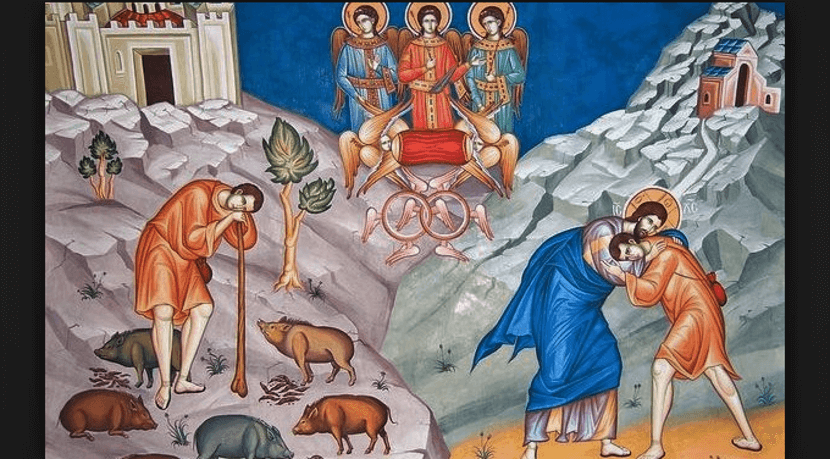THE PRODIGAL SON (LUKE 15:11-32)
Restoring our sense of belonging through repentance
This Gospel is read on the third Sunday before the beginning of the Great Lent called the Sunday of the Prodigal Son. In a very simple way, God reveals His love, patience and forgiveness towards every single human being. It is very clear that “a certain man” in this parable represents God the Father. The older son represents all righteous people, and the younger son represents all sinners. The younger son asks for his portion of the inheritance and wants to go his own way separating himself from his father and his brother. He was not stealing or taking anything that was not rightfully his and already coming his way. Christ does not explain why this young man goes to “a far country” and “wastes his possessions in prodigal living”. Even Greek philosophers, thousands of years ago were writing about how young people lacked patience, respect and had difficulty waiting for good things. Little has changed today.
Because of the impatience of youth, many good things for which they should have waited for in patience get ruined. Here we see the younger son, immature, unable to control his desires, and unable to manage his resources. He simply said, he wasn’t prepared to wait to receive the inheritance he claimed. In the original text of the New Testament, the Greek word “ousia” used here to describe the younger’s son inheritance as “portion of goods”, could be literally translated as “essence”. That indicates man receiving his free will and his rational mind from God. As Adam did in Eden, the younger son uses these possessions to rebel against his father. The “far country” represents life in separation from God. Today, many young and healthy people, full of physical strength and energy, living in a socially secure society, don’t think much about God and eternal life. During the period of adolescence, God is usually perceived as someone who forbids, prohibits, controls and put limits on a youthful way of life. Separation from God always gives the same result: wasting our possessions with prodigal living. When we immerse ourselves, and give in to our bodily desires, our free will and our rational mind loses its value. It is very easy for a man to become a slave of his own addictions (passions), and to downgrade his own life to physical satisfaction. That kind of life cannot last forever, because eventually every man starts to be tired, alone, abandoned, without true friends and without any hope. That’s the moment when a man struggles to find real purpose of his own existence and to discover the meaning of life. The Gospel describes that moment, when the prodigal son starts serving someone who’s much worse than he is. That is the moment when he starts feeding someone else’ s swine to survive. Hunger, which started in that “far country”, is the direct result of God’s absence and because of the young man’s constant life in sin. Through hunger our souls cry after God. People who are not physically hungry can have that feeling also. The only food, which can satisfy that kind of spiritual hunger, is food that leads to everlasting life – Jesus Christ. There is no accident that the Heavenly Kingdom is described in the New Testament as a: feast, wedding, supper, dinner... When a man starts feeling that kind of hunger, and realizes he is on the wrong path, he will slowly begin to turn towards God, just like the prodigal son did. What follows in the Gospel, is a lesson about repentance that takes place in stages. 1) “When he came to himself” is the beginning of repentance of the younger son. He needed first to come to himself, because a person immersed in sin is living outside his true self. (See Romans 7:17-24). This is a spiritual awakening of a man, when he realizes that the life he lives has no meaning. Great despair usually follows together with the question:” What now?” 2) The next phase is finding new hope: “ How many of my father’s hired servants have bread enough and to spare, and I perish with hunger!”. The bread symbolizes Christ. A new hope gives man a chance to change something in his life. 3) Third step is inner repentance, when he confesses everything to himself: “I am no longer worthy to be called your son.” He finally accepts mistakes he made, realizing his loss of sonship. 4) The forth phase is when a man has to do something about his problem, because realization is not enough for a repentance to be completed. In this case, the prodigal son gives up his previous way of life by leaving that “far country”. In the Gospel that is symbolically described: “And he arose and came to his father”.
“But when he was still a great way off, his father saw him….” We can see here that the father/God, doesn’t wait passively for his younger son/man to come to him. The fact that he saw his younger son while he was still a great way off is telling us that God constantly and actively waits for his son to appear on the horizon. That is the father who doesn’t ask for any explanations, but runs to meet his son, hugs him and kisses him. 5) This the moment when the prodigal son confesses his sins and his unworthiness to his father. That is the fifth step in repentance, and today this happens during the Holy Sacrament of Confession through which we confess our sins to God.
After his repentance was completed, the father restores him as his son: The robe signifies righteousness granted by baptism (Isaiah 61:10), the ring is family identity and the sandals refer to walking according to the gospel (Ephesians 6:15). Only a completed confession makes a new beginning for a repentant sinner. Through completed repentance we are restored as children of God - CHRISTIANS, sons and daughters of our Heavenly Father through His Only Son, Jesus Christ.
But, the process of restoration doesn’t end here. The father says to his servants to bring a fatted calf and kill it, to eat and be merry. This animal is a male calf raised on wheat in preparation for use as a religious offering. As the reconciliation of the prodigal son was not complete without the sacrifice of the calf, so man’s reconciliation and restoration with God is not by his repentance alone, but by Christ offering Himself on the cross. The festive dining on an animal “formed from wheat” is a clear reference to our partaking of the Eucharistic bread. Complete and full reconciliation between God and a man is happening through Holy Communion, when a man becomes one with Christ, and united with Christ adopted as a son of God. Eucharistic festivity is the moment when a man through union with God conquers death. That is the reason the father says: “For this my son was dead and is alive again; he was lost and is found.” Separation from God leads to spiritual death, on the other hand union with God leads to eternal life. Spiritual death is the only real and eternal death.
This is not the end of the story. The older son who represented righteous people, those who spent many years serving God, wasn’t rejoicing when his brother returned. He didn’t want to participate in the feast their father prepared to celebrate the return of his younger son. However, God asks us to rejoice when even the most blamable man on the earth is called to repentance. Through the older son, God is sending a message to people who, after a certain period spent in the Church, start to proclaim self-righteousness. That leads to a lack of mercy towards other people, especially towards sinners. “Lo, these many years I have been serving you; I never transgressed your commandment at any time…” are the words of a self – proclaimed righteous man, not of a repentant sinner. What was this older son doing beside his father all this time? He is actually the one who fatted the calf, which will be eaten at the feast. This man symbolizes all those faithful people who regularly worship, whose presence makes Liturgy and Eucharistic sacrifice possible. There is no Church without people. People are actually the Church.
Here we can see that the father/God always actively seeks those who stray. He also goes out to take care of his older son. Today, that is happening through Christ and His Church. Jesus confirms that by saying: “He who receives you receives Me, and he who receives Me receives Him who sent Me.” (Matthew 10:40). Regardless of the imperfection of people who belong to the Church and participate in worship, God is still considering them as His own children, royal priesthood, holy nation (1 Peter 2:9). The apostle Paul calls all Christians, including imperfect ones, “saints” (Philippians 1:1). Even when he is not rejoicing the return of his brother, his father is still addressing him as son: “Son, you are always with me, and all that I have is yours.” During the Holy Liturgy we hear words: “Holy to the Holies”. This relates to Christ who is giving Himself as Communion to the people.
This parable is teaching us not only about repentance, but also about how God is accepting our repentance. Regardless of how long and how often we worship, we are also warned against self – pride. Instead of gloating, we should rejoice about every man returning to our Heavenly Father, because that is our brother or sister who was “dead and is alive again” and who “was lost and is found”. We should watch over our sins, and never forget that the Lord is “not willing that any should perish but that all should come to repentance.” (2 Peter 3:9). Also the time of Great Lent is not only a time for repentance, but it is also a time to think about God’s immense love towards humans, and to answer positively to His constant calling to become His children through deification. The highest calling a human being can achieve in this life is to become a child of God. If we stray from God, we can always return as the prodigal son and God will restore our sonship.
Fr. Sasha Radoicic


